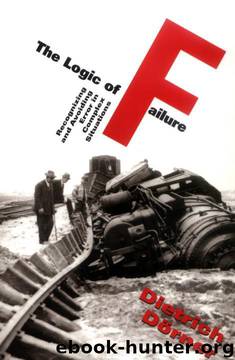The Logic Of Failure: Recognizing And Avoiding Error In Complex Situations by Dietrich Dorner

Author:Dietrich Dorner
Language: eng
Format: mobi
Published: 0101-01-01T00:00:00+00:00
Fig. 17. Questions and decisions of good (+-+-+) and bad (♦-♦-v) participants in von der Weth's experiment
Fig. 18. Areas of focus for good (+-+-+) and bad (V-v-v) participants over time
The relationship between success, level of information gathering, and readiness to act can also he the opposite of that in the lithum experiment, however. Figure 19 shows the number of decisions and the number of questions over eight phases of the Greenvale experiment. In this case, the good participants made more decisions and asked fewer questions than the had ones. That is, they behaved like the had participants in the lithum experiment.
Why? In my view, the difference lies in the time constraint, which was much more pressing in the lithum experiment. In both experiments, the good participants gathered enough information to let them make necessary decisions. The had participants reacted to the time pressure of the lithum experiment by refusing to gather information and by leaping into action. In the Greenvale experiment, however, bad participants responded to the absence of time pressure by gathering too much information. The excess information bred uncertainty, the uncertainty moved them to gather still more information, and that information inhibited their decision making all the more. The fact that the number of decisions the bad participants made after the fourth session sank rather than rose speaks for this interpretation.
Download
This site does not store any files on its server. We only index and link to content provided by other sites. Please contact the content providers to delete copyright contents if any and email us, we'll remove relevant links or contents immediately.
Modelling of Convective Heat and Mass Transfer in Rotating Flows by Igor V. Shevchuk(6440)
Weapons of Math Destruction by Cathy O'Neil(6281)
Factfulness: Ten Reasons We're Wrong About the World – and Why Things Are Better Than You Think by Hans Rosling(4742)
A Mind For Numbers: How to Excel at Math and Science (Even If You Flunked Algebra) by Barbara Oakley(3307)
Descartes' Error by Antonio Damasio(3279)
Factfulness_Ten Reasons We're Wrong About the World_and Why Things Are Better Than You Think by Hans Rosling(3239)
TCP IP by Todd Lammle(3185)
Fooled by Randomness: The Hidden Role of Chance in Life and in the Markets by Nassim Nicholas Taleb(3124)
The Tyranny of Metrics by Jerry Z. Muller(3073)
Applied Predictive Modeling by Max Kuhn & Kjell Johnson(3071)
The Book of Numbers by Peter Bentley(2968)
The Great Unknown by Marcus du Sautoy(2695)
Once Upon an Algorithm by Martin Erwig(2649)
Easy Algebra Step-by-Step by Sandra Luna McCune(2636)
Lady Luck by Kristen Ashley(2583)
Police Exams Prep 2018-2019 by Kaplan Test Prep(2549)
Practical Guide To Principal Component Methods in R (Multivariate Analysis Book 2) by Alboukadel Kassambara(2545)
All Things Reconsidered by Bill Thompson III(2394)
Linear Time-Invariant Systems, Behaviors and Modules by Ulrich Oberst & Martin Scheicher & Ingrid Scheicher(2371)
